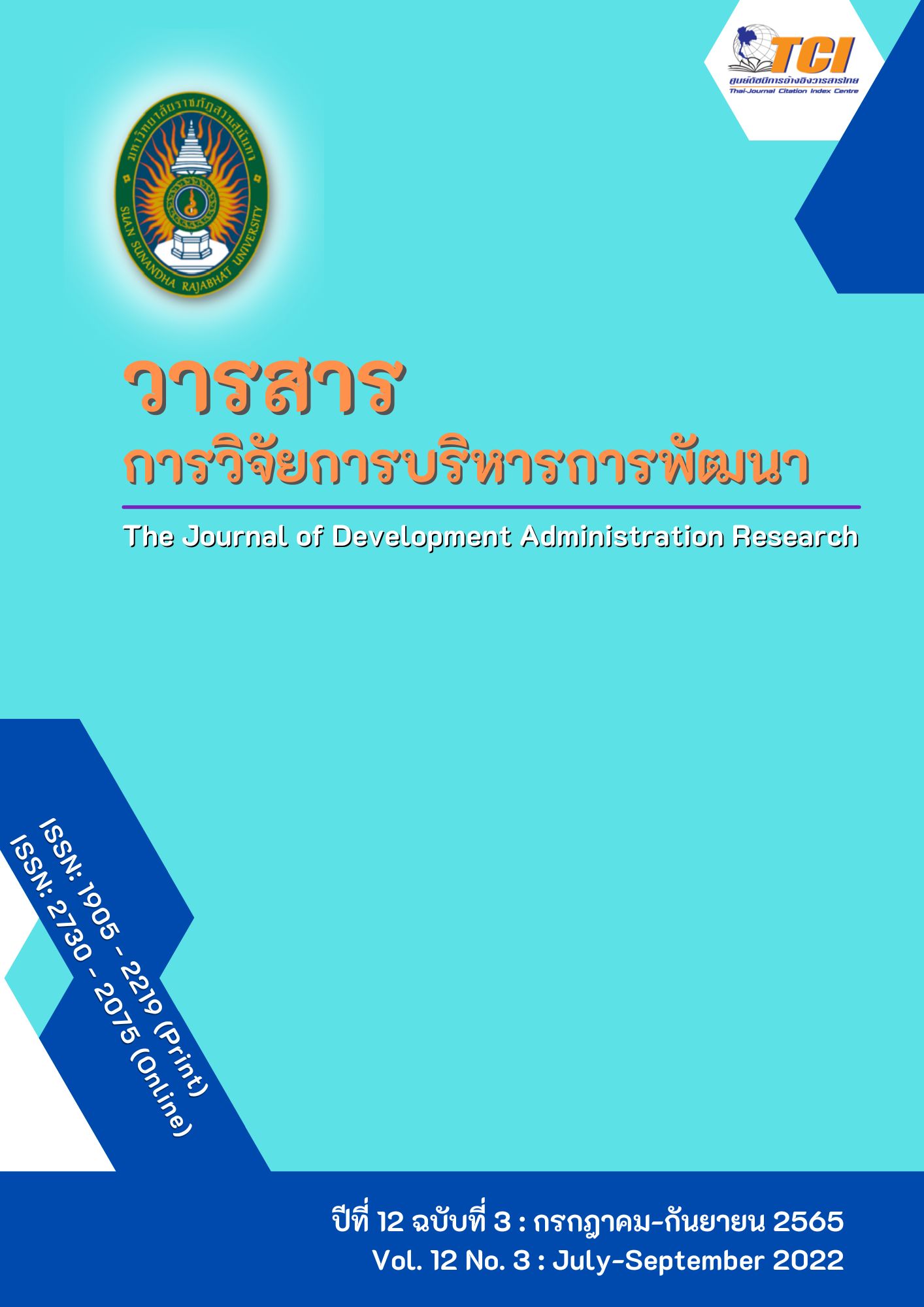ปัจจัยเชิงสาเหตุของพฤติกรรมการแลกเปลี่ยนความรู้ที่ส่งผลต่อ การสร้างทัศนคติความปลอดภัยในภาคการขนส่งสินค้า
คำสำคัญ:
พฤติกรรมการแลกเปลี่ยนความรู้, การสร้างทัศนคติความปลอดภัย, ความตั้งใจขององค์กร, วัฒนธรรมความปลอดภัยองค์กร, บรรทัดฐานของการตอบแทนต่อกันบทคัดย่อ
บทความนี้มีวัตถุประสงค์เพื่อ 1) ศึกษาปัจจัยเชิงสาเหตุที่ส่งผลต่อพฤติกรรมการแลกเปลี่ยนความรู้และการสร้างทัศนคติความปลอดภัยในภาคการขนส่งสินค้า 2) ศึกษาอิทธิพลของปัจจัยเชิงสาเหตุของพฤติกรรมการแลกเปลี่ยนความรู้ที่ส่งผลต่อการสร้างทัศนคติความปลอดภัยในภาคการขนส่งสินค้า และ
3) สร้างแบบจำลองของปัจจัยเชิงสาเหตุของพฤติกรรมการแลกเปลี่ยนความรู้ที่ส่งผลต่อการสร้างทัศนคติความปลอดภัยในภาคการขนส่งสินค้า การวิจัยครั้งนี้เป็นการวิจัยเชิงคุณภาพและเชิงปริมาณ โดยรวบรวมข้อมูลจากผู้ให้สัมภาษณ์ที่ทำงานในภาคการขนส่งสินค้าจำนวน 5 คน และ เก็บรวมรวมข้อมูลจากกลุ่มตัวอย่างที่เป็นผู้ประกอบการธุรกิจการขนส่ง จำนวน 520 คนเครื่องมือที่ใช้เก็บรวบรวมข้อมูล ได้แก่ แบบสัมภาษณ์และแบบสอบถามออนไลน์ สถิติที่ใช้ในการวิเคราะห์ข้อมูล ได้แก่ สถิติเชิงพรรณนาและสถิติเชิงอนุมาน
ผลการวิจัยพบว่า ความตั้งใจขององค์กรส่งผลต่อพฤติกรรมการแลกเปลี่ยนความรู้, ความตั้งใจขององค์กรส่งผลต่อการสร้างทัศนคติความปลอดภัยผ่านพฤติกรรมการแลกเปลี่ยนความรู้, วัฒนธรรมความปลอดภัยองค์กรส่งผลต่อพฤติกรรมการแลกเปลี่ยนความรู้, วัฒนธรรมความปลอดภัยองค์กรส่งผลต่อการสร้างทัศนคติความปลอดภัยผ่านพฤติกรรมการแลกเปลี่ยนความรู้, บรรทัดฐานของการตอบแทนต่อกันส่งผลต่อพฤติกรรมการแลกเปลี่ยนความรู้, บรรทัดฐานของการตอบแทนต่อกันส่งผลต่อการสร้างทัศนคติความปลอดภัยผ่านพฤติกรรมการแลกเปลี่ยนความรู้, และพฤติกรรมการแลกเปลี่ยนความรู้ส่งผลต่อการสร้างทัศนคติความปลอดภัย ฉะนั้น ผู้ประกอบการธุรกิจขนส่งสินค้าสามารถนำผลที่ได้จากการศึกษาวิจัยไปพัฒนาการวิจัย อีกทั้งพัฒนาระบบการจัดการขนส่งให้ก้าวหน้า ส่งผลให้เพื่อการบริหารพฤติกรรมการแลกเปลี่ยนความรู้ และการสร้างทัศนคติความปลอดภัยกับลักษณะการขนส่งรูปแบบอื่นได้
เอกสารอ้างอิง
Alaghbari, M., Shabbir, M.S., Abbasi, S.G., and Abbas, M. (2020). Organizational culture and knowledge sharing behavior: Moderated mediation model. Utopía Y Praxis Latinoamericana, 25(1), 480-490.
Gloor, P. and Colladon, A.F. (2016). The power of reciprocal knowledge sharing relationships for startup success. Journal of Small Business and Enterprise Development, 23(3), 636-651.
Amin, M.B. and Ruby, M.R.B. (2020). Human resource management practices and employee knowledge sharing behavior: Mediating role of knowledge sharing intention. Asian Journal of Empirical Research, 10(5), 150-164.
Dey, T. and Mukhopadhyay, S. (2018). Influence of behavioral intentions, affective trust and affective commitment on knowledge sharing behavior. International Journal of Knowledge Management, 14(2), 37-51.
Dorigan, G.H., Mingato, D.F.P., and Guirardello, E.B. (2020). Nursing safety attitudes: relationship with time of experience and intention to leave the job. Rev Gaúcha Enferm,41(3), e20190274. https://doi.org/10.1590/1983-1447.2020.20190274.
Edgar, D., Middleton, R., Kalchbauer, S., and Wilson, V. (2021). Safety Attitudes Build Safety Culture: Nurse/Midwife Leaders Improving Healthcare Using Quantitative Data. Journal of Nursing Management, 29(2), 2433-2443.
Hair, J., Black, W., Babin, B., Anderson, R. and Tatham, R. (2006) Multivariate data analysis. 6th Edition. Upper Saddle River, NJ: Pearson University Press.
Ismail, I., Tajuddin, N., and Yunus, N. (2016). Trust and intention to share as predictors of online knowledge-sharing behavior: Social sciences. In Proceedings of the Regional Conference on Science, Technology and Social Sciences (RCSTSS 2016), 57-67.
Licorish, S.A. and MacDonell, S.G. (2021). Understanding the attitudes, knowledge sharing behaviors and task performance of core developers: A longitudinal study. Retrieved February 27, 2022 from www.researchgate.net
Liu, H., Yu, D., Zhao, S., and Sun, S. (2019). Medical students’ perceptions and patient safety education in China using the medical student safety attitudes and professionalism survey: Safety attitudes and behavioural intentions. Research Square. https://doi.org/ 10.21203/rs.2.11835/v1
Marquardt, N. (2010). Implicit safety-critical attitudes within safety culture. Risk Management, 327-344.
Non, A. (2020). Training participation and the role of reciprocal attitudes. CESifo Economic Studies, 66(1), 33-59.
Pennings, G., Ravel, C., Girard, J.M., Domin-Bernhard, M. (2018). Attitude towards reciprocity as a motive for oocyte donation. European Journal of Obstetrics & Gynecology and Reproductive Biology, 225, 194-198.
Raharso, S. (2021). Impact of organizational climate on knowledge-sharing behavior: An empirical study in minimarkets. Journal Bisnis dan Kewirausahaan, 17(2), 94-105.
Ruttanapun, P. (2013). A Causal Model of Teachers’ Knowledge Sharing Behaviors : Model Invariance Analysis. Retrieved February 27, 2022 from http://cuir.car.chula.ac.th/ handle/123456789/43136
Saad, A. and Haron, H. (2018). A Reciprocity knowledge sharing system model for academic institutions. IEEE International Conference on Automatic Control and Intelligent Systems (I2CACIS). https://doi.org/10.1109/I2CACIS.2018.8603682.
Sawan, F., Suryadi, S., Nurhattati (2021). Impact of organizational culture on knowledge sharing behavior. 4th International Conference on Research of Educational Administration and Management (ICREAM 2020), 526, 331-335.
Venesoja, A., Lindström, V., Castrén, M., and Tella, S. (2021). Exploring safety culture in the Finnish ambulance service with Emergency Medical Services Safety Attitudes Questionnaire. Scandinavian Journal of Trauma Resuscitation and Emergency Medicine, 29(1),11.
Wang, K.Y., Chou, C.C., and Lai, J.C.Y. (2018). A structural model of total quality management, work values, job satisfaction and patient safety - culture attitude among nurses. Journal of Nursing Management, 27(1),1-8.
Yenyuak, C. (2022). Organization Creativity Management Affecting the Innovative Model in the Real Estate Business. Business Review, 14(1), 448-459.
Zailani, B.M., Abubakar, M., and Ibrahim, Y.M. (2021). The Role of Safety Attitude in Changing Safety Behavior and Hazard Recognition Capability of Construction Workers. Laryea, S. and Essah, E. (Eds) Procs West Africa Built Environment Research (WABER) Conference, 9-11 August 2021, Accra, Ghana, 1001-1011.
Zhai, H., Li, M., Hao, S., and Chen, M. (2021). How Does Metro Maintenance Staff’s Risk Perception Influence Safety Citizenship Behavior—The Mediating Role of Safety Attitude. International Journal of Environmental Research and Public Health,18(10), 5466.
ดาวน์โหลด
เผยแพร่แล้ว
รูปแบบการอ้างอิง
ฉบับ
ประเภทบทความ
สัญญาอนุญาต
ลิขสิทธิ์ (c) 2022 วารสารการวิจัยการบริหารการพัฒนา

อนุญาตภายใต้เงื่อนไข Creative Commons Attribution-NonCommercial-NoDerivatives 4.0 International License.
บทความที่ได้รับการตีพิมพ์เป็นลิขสิทธิ์ของมหาวิทยาลัยราชภัฏสวนสุนันทา
ข้อความที่ปรากฏในบทความแต่ละเรื่องในวารสารวิชาการเล่มนี้เป็นความคิดเห็นส่วนตัวของผู้เขียนแต่ละท่านไม่เกี่ยวข้องกับมหาวิทยาลัยราชภัฏสวนสุนันทา และคณาจารย์ท่านอื่นๆ ในมหาวิทยาลัยฯ แต่อย่างใด ความรับผิดชอบองค์ประกอบทั้งหมดของบทความแต่ละเรื่องเป็นของผู้เขียนแต่ละท่าน หากมีความผิดพลาดใดๆ ผู้เขียนแต่ละท่านจะรับผิดชอบบทความของตนเองแต่ผู้เดียว




